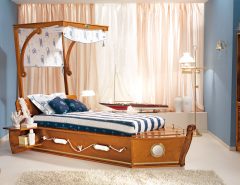Primo Caroti, born in 1911, was nicknamed “Pozzolino”, the “little well”, a reference to his deep knowledge, his capacity for doing many things and the fact that he was able to spread this knowledge to others. In small Tuscan villages, irony always goes hand in hand with wisdom.
Primo Caroti had also been carpentry teacher at the vocational school of Pontedera, where he had taught many young craftsmen the art of cabinet making, how to use gouges and the structural foundations for creating beautiful and lasting furniture items.
Primo Caroti, the husband of Eurosia, may have also earned his nickname of “Pozzolino” because five male children were born from their love. And it was for them that in 1960 he founded Ditta Primo Caroti, a small furniture workshop where rough wood turned into cupboards, beds, bread chests, cabinets, tables and chairs for the people of Ponsacco and its surroundings.
His sons soon started to help him at his job, improving the quality and increasing the quantity of furniture being manufactured, and in 1976 Ditta Primo Caroti became F.lli Caroti, the “Caroti Brothers”: a larger workshop, many projects and a strong will to take Caroti furniture beyond the borders of Tuscany.
These plans took shape in the following decades. In 1987 the workshop turned into an industry with specialised machinery and painting lines for mass production. During those years, Caroti furniture – which in the meantime had picked up several styles, ranging from classic to old navy – began to travel outside Italy, taking Italian design and know-how around the world.
In 2000, the third generation of Carotis took over the company, providing new impulse to business and investing in projects for the future. In 2015, Caroti is launching Concept, a new line of furniture where interior decoration, fashion and technology ally in a quest for innovative interpretations and sustainable design bringing together a mix of materials: solid wood, leather, steel.
For 55 years, wood has been showing us the path to follow: flexibility and adaptation to face changing seasons, drawing sap from the roots to grow taller and taller. But maybe Primo Caroti, called “Pozzolino”, already knew this and left it as his legacy.







